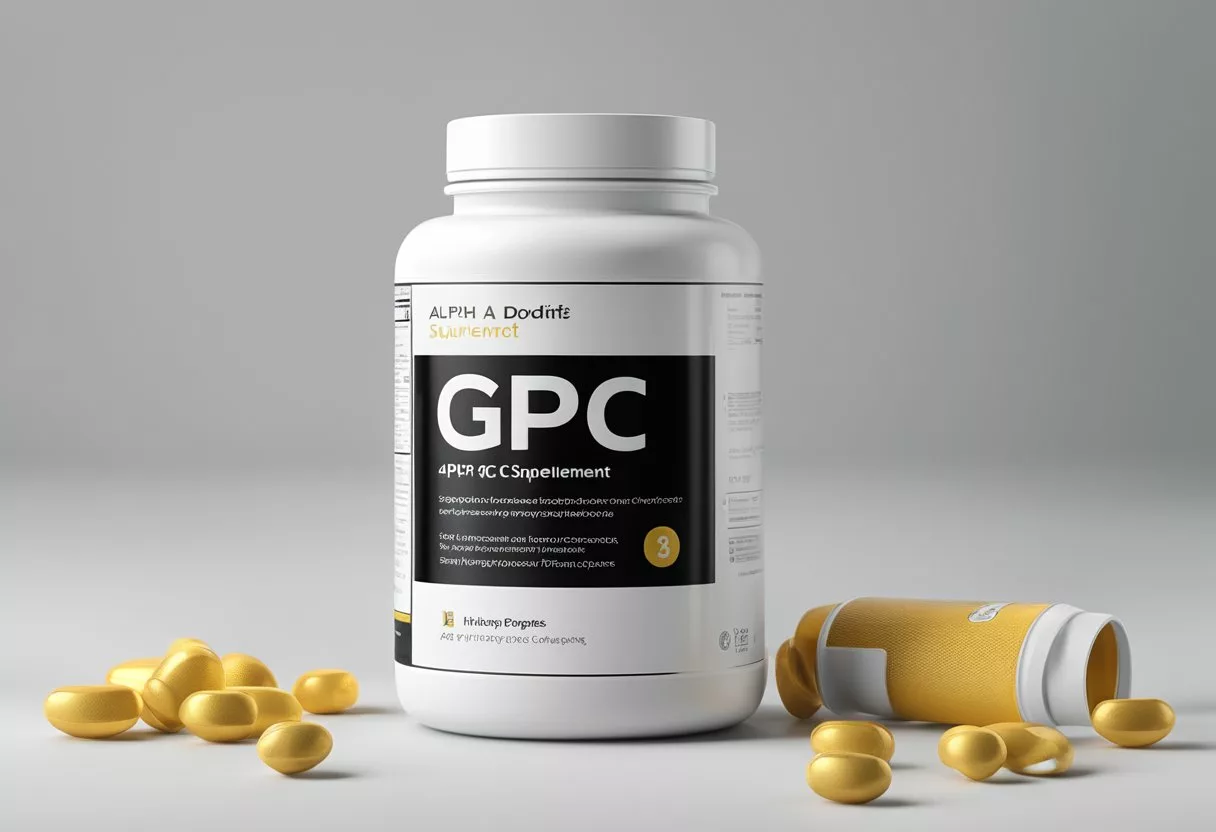Alpha-GPC is a popular supplement that has gained attention for its potential to improve cognitive function and overall brain health. It is often used to enhance memory, learning, and mental clarity. Many people find that Alpha-GPC can boost mood and energy levels, making it a versatile choice for those seeking cognitive and physical benefits.

Despite its benefits, Alpha-GPC may come with some risks and side effects, such as headaches, nausea, and low blood pressure. It is important to consider these potential downsides when deciding whether to include Alpha-GPC in your supplement regimen. Understanding both the advantages and risks can help you make an informed decision about using this supplement.
Key Takeaways
- Alpha-GPC can improve cognitive function and mood.
- Be aware of potential side effects like headaches and nausea.
- Weigh benefits against risks before starting Alpha-GPC supplements.
What is Alpha-GPC?

Alpha-GPC, also known as l-alpha-glycerylphosphorylcholine, is a compound that impacts brain health and cognitive function. It enhances the neurotransmitter acetylcholine, which plays a crucial role in learning and memory.
Chemical Structure and Properties
Alpha-GPC is a choline-containing compound. Its chemical structure is similar to phosphatidylcholine found in lecithin. The ‘alpha’ in Alpha-GPC refers to the position of the glyceryl group, making it more bioavailable.
It is highly water-soluble, allowing it to cross the blood-brain barrier efficiently. This high bioavailability means it’s rapidly absorbed and utilized by the brain. It acts as a precursor to acetylcholine, an important neurotransmitter for cognitive health.
Role in Cognitive Function
Alpha-GPC boosts cognitive performance by increasing acetylcholine levels in the brain. Acetylcholine is vital for memory, learning, and overall brain function. Higher acetylcholine levels can lead to improved focus and mental clarity.
It may also support cognitive health in aging populations and those with cognitive impairments. Studies suggest it could help with conditions like Alzheimer’s. The compound’s neuroprotective properties make it beneficial for maintaining brain function and delaying cognitive decline.
Sources and Dietary Intake
Alpha-GPC can be obtained through dietary supplements and food. Some natural sources of choline, which can be converted to Alpha-GPC, include soy lecithin, eggs, and beef. These foods provide the necessary building blocks for acetylcholine production.
While Alpha-GPC supplements can be taken to achieve higher doses, integrating choline-rich foods like soy lecithin into the diet is also beneficial. Supplements usually offer a more concentrated form, making it easier to reach effective amounts for cognitive benefits.
Health and Cognitive Benefits

Alpha-GPC is known for its potential to boost memory, support brain health, and enhance physical performance. It provides significant aid in neurological disorders and helps with recovery after physical activities.
Memory Enhancement and Learning
Alpha-GPC is reported to improve memory and learning functions. Studies suggest it enhances cognitive performance and increases attention. This nootropic agent aids in the synthesis of acetylcholine, a neurotransmitter crucial for memory and learning. Using Alpha-GPC may benefit those experiencing memory loss or cognitive decline due to aging.
It is thought to be particularly beneficial for students or professionals who need to retain large amounts of information. Additionally, evidence indicates its potential in supporting brain health and enhancing overall cognitive function.
Support in Neurological Disorders
Alpha-GPC shows promise in managing various neurological disorders. It may help in treating conditions like Alzheimer’s disease, stroke, and vascular dementia. The supplement is believed to support cognitive recovery after a stroke by improving memory and aiding brain function.
Some reports highlight its use in reducing the symptoms of cognitive decline and dementia. Its role in providing choline, an essential nutrient for brain function, is crucial in supporting those with neurological challenges.
Physical Performance and Recovery
Athletes may find Alpha-GPC beneficial for improving physical performance and aiding in recovery. It is thought to enhance muscle strength and lean muscle mass. Studies have shown increased growth hormone secretion, which plays a role in muscle recovery and overall metabolism.
People engaged in intense physical activities might experience less fatigue and quicker recovery by integrating this supplement into their regimen. The potential benefits also include better focus and sustained attention during workouts or competitions.
Supplemental Use and Dosage

Alpha-GPC is commonly used for its potential benefits in enhancing cognitive functions and supporting mental health. It also has considerations for dosage and interactions with other medications.
Nootropic Use and Effects
Alpha-GPC is popular as a nootropic supplement. It is known to support cognitive functions like memory, focus, and thinking skills. Users have reported improved mood and mental energy.
This supplement may help in situations that require intense concentration and alertness. Studies suggest that Alpha-GPC can enhance brain performance by increasing levels of acetylcholine, a key neurotransmitter for learning and memory.
Dosage Guidelines and Safety
For cognitive benefits, the recommended dosage of Alpha-GPC is often 1200 mg per day, divided into three doses of 400 mg each. This dosage has been found to be well-tolerated and effective.
Long-term studies have not reported serious side effects at this dosage. Some minor side effects can include fatigue, nausea, headaches, and digestive discomfort. It’s important to follow dosing guidelines to minimize risks.
Interactions With Medications
Alpha-GPC can interact with medications, especially those affecting choline levels in the body. Individuals on prescription drugs for cognitive functions should consult a healthcare provider before starting supplementation.
This ensures that there are no adverse interactions. Additionally, Alpha-GPC may affect blood pressure, so individuals on medication for hypertension should be cautious.
Alpha GPC Supplement Benefits, Dosage and Side Effects
ALPHA-GPC – Uses, Side Effects, and More
Alpha-GPC benefits, dosage, and side effects
Alpha GPC: Review of Benefits, Effects, Dosage
Alpha-GPC: Benefits, Uses, Dosage, and Side Effects
Potential Risks and Side Effects

Alpha-GPC is generally well-tolerated but may cause various adverse effects. These range from common gastrointestinal issues to more serious health concerns like an increased risk of stroke.
Common Adverse Effects
Many users report experiencing mild side effects when taking alpha-GPC. These often include fatigue, nausea, headaches, and upset stomach. Less common issues can be heartburn and diarrhea. Some individuals may also experience dizziness and nervousness. These side effects are usually mild and transient, but they can be uncomfortable for those affected.
In some cases, alpha-GPC might cause low blood pressure, leading to symptoms such as dizziness or lightheadedness. People taking alpha-GPC should monitor their symptoms and speak with a healthcare provider if side effects persist.
Serious Health Concerns
While alpha-GPC is considered safe for short-term use, there are serious health concerns to be aware of. Most notably, recent studies suggest a potential link between alpha-GPC and an increased risk of cardiovascular disease (CVD). One study observed a 46% higher risk of stroke in users compared to non-users. This risk is believed to be associated with how alpha-GPC is metabolized, affecting processes within the body.
Another serious concern includes growth hormone elevation, which might have unexpected effects if not carefully monitored. Individuals using alpha-GPC should keep track of their cardiovascular health and consult medical professionals regularly.
Special Populations and Considerations
Certain populations need to exercise additional caution when using alpha-GPC. Pregnant and nursing women should consult a healthcare provider before use due to a lack of comprehensive studies on safety. Alpha-GPC’s ability to cross the blood-brain barrier could have implications for fetal and neonatal development.
People with pre-existing low blood pressure should be aware that alpha-GPC could exacerbate this condition. Finally, those experiencing gastrointestinal distress or insomnia should consider alternative supplements. Given the potential for serious side effects, special populations should approach alpha-GPC with caution and under medical advice.
Research and Studies

Research on alpha-GPC has examined its effects on cognitive function, physical performance, and specific outcomes in both animal models and human trials. Studies have looked into its potential as a nootropic, cognitive enhancer, and even its impact on growth hormone levels.
Clinical Trials and Outcomes
Numerous clinical trials have evaluated alpha-GPC’s impact on cognitive function, particularly in older adults. A study observed that alpha-GPC improved neurological function but also suggested an increased risk of stroke after prolonged use in older adults. According to research, alpha-GPC can enhance mental focus and acuity with fewer side effects compared to caffeine.
Studies have measured physical performance outcomes, such as a study focusing on vertical or countermovement jumps, indicating positive results in these areas. Human trials registered with the University Hospital Medical Information Network highlighted the compound’s potential benefits, stressing the need for further investigation into larger doses for more significant performance gains.
Comparative Analyses
Comparative studies have often set alpha-GPC against other cognitive enhancers like racetams and huperzine A. While nootropics like racetams are traditionally used for cognitive enhancement, alpha-GPC has shown promise by improving mental function without causing the nervous or anxious feelings associated with caffeine.
Animal models have been essential in understanding alpha-GPC’s effects. Research has shown that alpha-GPC supplementation can lead to improvements in cognitive function, but also carries risks such as promoting atherosclerosis in hyperlipidemic conditions. These findings make it crucial to compare alpha-GPC’s safety and efficacy thoroughly with other nootropics and dietary supplements.
Global Perspectives
Alpha-GPC is used worldwide, with its acceptance and regulation varying across regions. In Europe, it is often prescribed for cognitive decline and is available over-the-counter in some countries.
Alpha-GPC in Europe
In Europe, Alpha-GPC is commonly used for treating cognitive decline, especially in cases of Alzheimer’s disease. It is available both by prescription and over-the-counter, depending on the country. For instance, in Italy and France, it is often prescribed to older adults experiencing memory issues.
The dosage and administration guidelines are well-established. Treatment usually involves taking Alpha-GPC in doses of 400 mg, three times a day, totaling 1200 mg daily. This recommendation is based on clinical studies showing its effectiveness in improving cognitive functions.
Additionally, Alpha-GPC’s safety profile in Europe appears favorable, with serious side effects rarely reported. Nonetheless, recent studies have raised concerns over its potential to increase cardiovascular risks, highlighting the need for further research and cautious use.
Conclusion
Alpha-GPC has demonstrated multiple benefits for cognitive function while presenting some potential side effects. However, it has also shown to be safe at recommended dosages for most individuals.
Summary of Benefits and Precautions
Benefits: Alpha-GPC is known for enhancing memory and cognitive function. Studies have shown it can boost energy and mood, making it beneficial for both physical and mental health. For individuals with Alzheimer’s, Alpha-GPC has been observed to improve memory and cognitive performance. Optimal dosages for these effects range around 1,200 mg per day, split into three doses of 400 mg each.
Precautions: While generally safe, Alpha-GPC can cause side effects in some individuals. These may include fatigue, nausea, headaches, upset stomach, and lightheadedness. Concerns have also been raised about its potential to increase the risk of cardiovascular disease, especially with long-term use. Therefore, it’s vital to monitor dosage and consult a healthcare provider before starting supplementation.
Frequently Asked Questions
Key points include understanding potential side effects, dosage recommendations, and possible long-term risks of Alpha GPC.
What are the common side effects of taking Alpha GPC?
Common side effects include fatigue, nausea, headaches, upset stomach, diarrhea, heartburn, and nervousness. Some individuals may also experience low blood pressure and lightheadedness.
Can Alpha GPC use lead to dependency or withdrawal symptoms?
There is no evidence suggesting that Alpha GPC leads to dependency or withdrawal symptoms. It is generally considered safe when taken as directed.
What is the recommended daily dosage of Alpha GPC for adults?
The recommended dosage is typically 300 to 1,200 mg per day. For cognitive enhancement, especially in cases like mild to moderate Alzheimer’s disease, 1,200 mg per day is often divided into three doses of 400 mg each.
How does Alpha GPC affect mood disorders such as depression?
Alpha GPC may help improve mood by boosting levels of acetylcholine, a neurotransmitter linked to memory and learning. However, more research is needed to fully understand its impact on mood disorders like depression.
Are there any long-term health risks associated with Alpha GPC consumption?
Long-term use of Alpha GPC has not been shown to cause serious health risks when taken at recommended dosages. However, concerns exist about its potential to increase the risk of cardiovascular disease due to its role as a substrate for certain metabolic pathways.
Can Alpha GPC usage influence the risk of stroke?
Recent concerns have been raised about the potential of Alpha GPC to increase the risk of cardiovascular disease, which includes stroke. Further research is needed to determine the exact relationship between Alpha GPC usage and stroke risk.